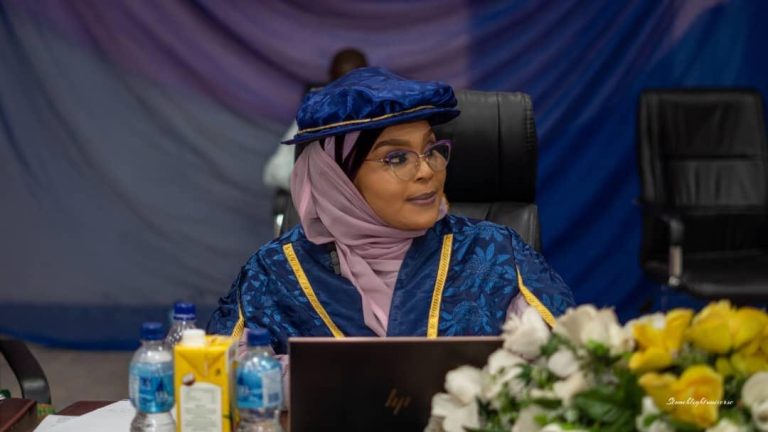By Ibironke Ariyo
The founder of Aspire Women Forum, a non-governmental organisation, Dr. Zainab Marwa has described systemic gender inequality as one of the major causes of poverty among women in Nigeria especially in North Central part of the country.
Dr. Zainab explained this in her paper titled, “The Intersectionality of Poverty and Gender in North Central Nigeria.”
The NGO leader, who presented the paper as a guest speaker at the 9th Distinguished Public Lecture at the Federal University, Lokoja, lamented that despite various intervention programs, women’s poverty persists.
“Imagine a country where resources are abundant, but the hands that work the hardest remain those that need them the most. In the heart of North Central Nigeria, this paradox is the daily reality of millions of women.
“Although the region is known for its rich cultural heritage and resources, its women are trapped in poverty and work tirelessly but rarely reap the fruits of their labor.
“These women face much more than just economic hardship; they face a web of systemic inequalities that limit their progress, diminish their potential and increase their struggles,” he lamented.
Zainab said that “according to the National Bureau of Statistics (2020), 70% of Nigerians below the poverty line are women.” In North Central Nigeria, the poverty rate for women is 57.3 percent, while that for men is 45.5 percent.
“Women face barriers to education, with a literacy rate of 59.3 percent, compared to 74.4 percent for men (UNDP, 2020). Only 21 per cent of women are in paid employment (ILO, 2020).
“These statistics represent limited opportunities and lost potential,” he continued.
Contextualizing the challenges that make it difficult for women to break the cycle of poverty, Dr. Zainab Marwa noted that “in predominantly Muslim areas, cultural norms may prioritize early marriage for girls, which could limit their educational opportunities.”
“A woman living in a rural community may face significant barriers to accessing land ownership due to traditional inheritance laws that favor male relatives.
“In urban settings, low-income women may struggle to access quality health care.
“Intersectionality encourages us to consider the impact of gender, as well as factors such as ethnicity, marital status and place of residence, on a woman’s experience of poverty.”
“For example, a widowed woman living in a rural area faces different challenges than a married woman living in the city, which affects her access to resources and her risk of violence,” she added.
The NGO director said intersectionality is a clear reminder that gender and poverty do not exist in isolation, but intersect in ways that increase women’s vulnerability.
She said the overlapping challenges go beyond the daily struggle for survival, adding that women in north-central Nigeria experience the compounding effects of poverty in deeply sexist ways.
He said they face not only economic exclusion but also cultural marginalization that diminishes their voice and neglects their contributions.
“Despite their efforts, women remain largely invisible in the economic and social fabric of their communities, perpetuating the cycle of poverty and powerlessness.
“Women in north-central Nigeria, especially those from low-income backgrounds, face barriers to education, healthcare and economic opportunities.
“Contextual factors, including cultural norms and patriarchal systems, perpetuate inequalities.
“Addressing these issues requires a deep understanding of power dynamics and recognition of the potential of women’s empowerment initiatives to bring about change,” she said.
Dr. Zainab said that to address these challenges, there is an urgent need to focus on concrete implementation of effective poverty alleviation programs, which must adopt a multidimensional approach to bring lasting change.
These, he said, should include: economic empowerment, job training and skills development programs, community-based social protection initiatives and improved access to healthcare.
This, he added, includes, among others, education and awareness programs and the use of technology as a powerful tool to expand financial inclusion and access to essential services.
“By implementing these interconnected strategies, we can create a supportive ecosystem that empowers women and allows them to escape the cycle of poverty and build a better future for themselves and their communities,” he added.



